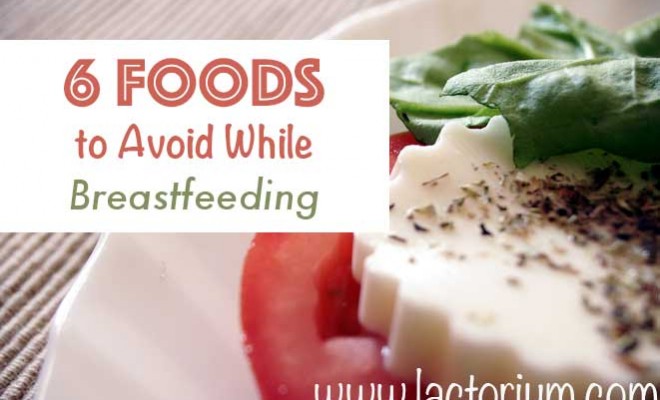
Breastfeeding
6 Foods to Avoid While Breastfeeding
Breastfed babies receive vital nutrients directly from breastmilk. An incredible aspect of breastfeeding is that the food eaten by a mother is absorbed and altered to fit the nutritional needs of the baby receiving the breastmilk. Some foods, however, can be difficult for a baby’s sensitive stomach to digest. Additionally, certain foods can have an effect on a baby’s overall mood. In this post, we will discuss some foods that many mothers choose to avoid while breastfeeding.
Because all babies are different, sometimes a trial-and-error approach to foods is the best—or only—way to decide what you should or should not eat while nursing. It is generally safe and acceptable to eat any type of foods while you are nursing. If your baby seems content and comfortable, in most cases, he probably is content and comfortable. A food intolerance can develop over time, though, so be sure that you are in tune with your baby’s behavior and mannerisms so that you can easily notice if he is uncomfortable. Newborns may have an elevated sensitivity to certain foods, so you may find that avoiding some foods while your baby is a newborn is best. You can attempt to reintroduce those foods once he is a little older and his digestive system is more mature.
We surveyed several nurses to provide input of what foods they avoided while breastfeeding their babies. They were also asked why they avoided those specific foods. Here are some of the responses we received:
- Dairy – Dairy is a very common food that is avoided among nursing mothers. Many babies are unable to comfortably digest foods like cheese, yogurt, whole milk, and cream bases.
- Broccoli – Although broccoli offers many health benefits to mama, it can cause painful gas in nursing babies. Which can translate into many sleepless and frustrating nights for both mommy and baby.
- Tomato and tomato bases– The acidity in tomatoes can cause stomach discomfort and indigestion in babies.
- Raw spinach and other raw greens– These healthy veggies can unfortunately be tough on baby’s sensitive tummy causing gas and bloat.
- Beans – Beans can have the same effect on nursing babies as they do on most people – gas!
- Spicy foods – Tough on little bellies, spicy foods should only be ingested in small amounts or preferably avoided altogether.
These are just a few examples of some foods that may be difficult for breastfed babies to digest. These are not the only foods that can cause discomfort for babies. Intolerable foods and a baby’s reaction to them can vary. It’s best to discuss other food intolerances with your doctor and your child’s pediatrician should you need more information about which foods to eat while breastfeeding.
Some common signs of a food intolerance in your baby are irritability, unusual or inconsolable fussiness, spitting up more than normal, vomiting, skin rashes, constipation, or diarrhea. Speak with your doctor if you have difficulty or questions about identifying what food—if any—is causing your child’s discomfort or symptoms.
All babies are different, and their bodies digest and tolerate foods differently. Mothers may even discover that what they ate while nursing one child may cause another nursling to feel ill. The key to knowing what foods you should and should not avoid is knowing your baby and learning to recognize his reaction to what you eat. If he seems extra fussy or uncomfortable, examine what you ate during the day. If your baby has the same discomforts after you eat certain foods, try cutting those foods from your diet or a week or two.
Evaluate your baby’s response to the removal of those foods from your diet. You may even slowly reintroduce the specific foods after a few weeks to see if your baby has a reaction. Oftentimes, babies become more tolerant of foods as they grow and as their bodies develop. Sometimes, though, babies are always sensitive to specific foods, so it is necessary to avoid those foods for the entire duration of nursing.
Additionally, some foods and beverages should be avoided completely while breastfeeding. Research and information on the effect of alcohol on breastfeeding babies is very contradictory. Some reliable sources claim that no amount of alcohol is acceptable for nursing mothers, while others are less conservative and state that alcohol in moderation is safe. Speak with your pediatrician before drinking alcohol while nursing, and let him or her help you come to a decision with which you are comfortable.
Research on caffeine’s effect on nursing babies also varies. Generally, caffeine in moderation is safe and acceptable. If you notice a change in your baby’s behavior or comfort, try cutting out caffeine from your diet and examining his reaction. Also, always speak with your pediatrician if you feel unsure about caffeine intake or your diet.
If you have a family history of specific food allergies or intolerances, avoid these foods and speak with your doctor about if or how you should introduce them into your diet.
It is important that nursing mothers eat a well-balanced diet and drink plenty of water every day. Sometimes it is necessary to avoid certain foods while breastfeeding, and sometimes those foods end up being the foods we love the most. All mothers can agree, though, that the comfort and happiness of our babies is more important than any yummy food—even if it is extra yummy!


0 comments